What is a Narcissist?
What do you think a narcissist is?
Do you know a narcissist?
Are you sure that the person who you think is a narcissist is actually a narcissist?
What is your definition of a narcissist which you use to classify whether someone is or is not a narcissist?
According to a dictionary definition, this is what a narcissist is:
.
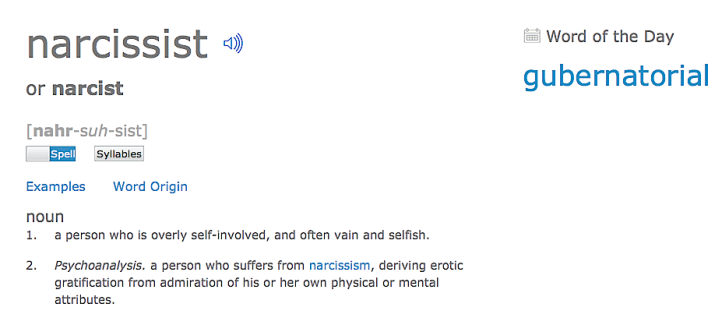 definition via Dictionary.com
definition via Dictionary.com
.
It struck me as appropriate that the Word of the Day on that site from which I got the definition happened to be ‘gubernatorial’ – of or relating to a state governor.
When I think of a narcissist of the #2 kind, I envision someone who wants to govern. Their state is that of being. They want to govern their state of being.
To govern their state of being they need others, because you can’t be who you’ve decided you are without others confirming it to you, for you, especially when you lack proof of your imagined self to give to yourself, therefore they need to govern the state of being of others too.
This is a full time job, which stresses them out, as others are an unruly mob full of disobedient subjects, but it has to be done – 24/7/365 and sometimes 366.
The first rule of governing others is to get others to accept your rule and governorship.
What is the best way to do that? What is the easiest way to win over new subjects? To be gubernatorial…
Most narcissists are charming when you first meet them. They appear confident, in control, and like to take charge. They have a magnetic aura, are exciting, scintillating, and in their presence you feel special, especially when their intense gaze focuses on you and lets you know that you are their chosen one.
People can write as many red flag lists as they want to help us identify possible narcissists, but narcissists aren’t waving those red flags in our faces when we first enter their territory. On the contrary, they’re usually waving a white flag, and they’ll usually make you feel safe with them.
Why? How?
Because of your own narcissism. WAIT! Wait! Take a pause before you go off the deep end… you’re not a narcissist, but you do have narcissistic traits as these are natural and normal for all human beings.
Show me someone who claims not to have a narcissistic bone in their body, and I will point at the same person and show you a narcissist.
.
.
I like the definition of narcissist from that site as it clearly shows that there are two criteria for the term narcissist.
The first one is the older version, which was what people meant when they called someone a narcissist up until the second one started taking precedence and the term narcissist came to mean someone with Narcissistic Personality Disorder (NPD).
It refers to anyone who we consider to be up themselves. The sort of person who keeps having to check their reflection in shiny surfaces, who pampers and preens themselves, who talks endlessly about themselves, their interests, their this and that and the other thing. Me, me, me and me – is their motto.
It may apply to those people who post loads of selfies, take photos of their every meal to post online, video their lives, and share their every thought, movement, activity, emotion, everywhere they go, everything they do, and every fluctuation of their being….and share, share, share TMI about themselves on social media as though its front page news relevant to the rest of us.
They may be the old type of narcissist, but they’re not usually the type of narcissist who has NPD, but we may think they are because we find what they’re doing to be a disorder in our tidy world.
Someone with NPD may do those things, but they’re actually more likely to hide behind others than expose themselves to that degree. They’re more likely to post enigmatic selfies which look away from the camera and which are heavily filtered, if they post selfies at all – they prefer to use profile pictures of other people, celebrities, mythical beings (gods and goddesses are a favourite), famous characters, or others who they want to be. What they share of themselves may be more about how they perceive others, and how that makes them appear, they’re more likely to share what others are doing, eating, going, and make comments about how others are doing it wrong.
.
 extract via Can You Spot a Narcissist? by Alice G. Walton
extract via Can You Spot a Narcissist? by Alice G. Walton
.
They’ll share a personal story about a friend, roommate, colleague, family member, who did something stupid or which upset them – according to them, and it will be related in a way to make their audience agree with them. They will portray themselves as the victim-hero of an abuser-villain. Their selfish roommate bought the wrong type of milk – this roommate knows that they’re lactose intolerant, does this selfish idiot want to deliberate cause them pain, give them the squits!?! And they’ll ask you what you think by prompting you to share your own grievances with selfish stupid heartless people who don’t make you the centre of their world every minute of their day and lives… as though this is how it should be and any other way is insanity.
Narcissists of the NPD kind know how to bring out the less healthy side of narcissism in all of us – which is partly why we protect them, become their ‘minions’, to protect ourselves from those moments when our ugly side peeps out from behind our pretty facade. We feel guilty and ashamed, even more so because we enjoyed being a bitch or an a-hole, and felt justified in being that way for awhile. They gave us the okay… but afterwards the high of it wore off and the self-reflection hangover hurt like hell.
Sometimes we just want to sweep that under a rug.
If you’re worrying about being the second kind of narcissist, the NPD type, here’s a tip – If you can self-reflect, and if you’re concerned about your narcissistic behaviour which prompts you to take a closer look at yourself, you’re not an NPD type of narcissist.
You’re just being momentarily narcissistic, letting your inner narcissist out for a walk. It’s okay… as long as you’re aware and open to learnign from the experience. It can be healthy to do that.
Sometimes we need to be an egotist, and we are not necessarily harming anyone with our self obsession.
The first kind of narcissist, the very human kind, is an egotist.
.
.
We can all be the first type of narcissist, especially when viewed through the eyes of others. We perceive the surface of others until we get to know them better, and even then we may be more focused on who we are than who they are, more interested in ourselves than them, our interest in them is an extension of self-interest. We may be more concerned with what they think about us, rather than what they’re thinking about themselves or anything else.
Let’s talk about you – What do you think of me?
Even when we might think we can’t be narcissistic or egotistical because we’re too good at being humble, selfless and have gotten rid of our ego – that may be a construct of our ego. Anything you value in yourself is a form of narcissism, it is healthy, natural and normal narcissism at work within us. Narcissism is good for us, that’s why it exists.
However, we can get a bit carried away with it, and it can get on the nerves of others. That includes being too humble, selfless and without ego.
.
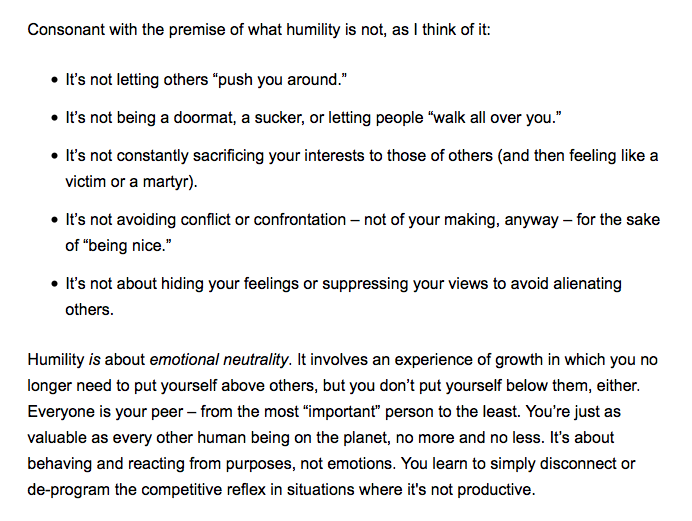 extract via The Paradoxical Power of Humility by Karl Albrecht, Ph.D.
extract via The Paradoxical Power of Humility by Karl Albrecht, Ph.D.
.
When I was younger I spent a lot of time pursuing self-transcendence. It was popular at the time, the New Age and the Self Help movements were gaining ground in the collective consciousness, and I bought into it mind, body and soul… because I didn’t have a healthy ego, hated myself and wanted to be someone else.
Since I hated myself I was a perfect candidate for every guru who was selling some miracle cure using magical thinking to change yourself into a perfect person.
There were many of those, and they all seemed to hate ego, wanted all of us following their methods to get rid of our ego, stop thinking about ourselves, and get with the program of being self-less, ego-less, less human… while their ego grew bigger and stronger with each person like me who bought into what they were selling, admired them for being the epitome of who we wanted to be, and we fed their ego with our egos which we were trying to discard.
.
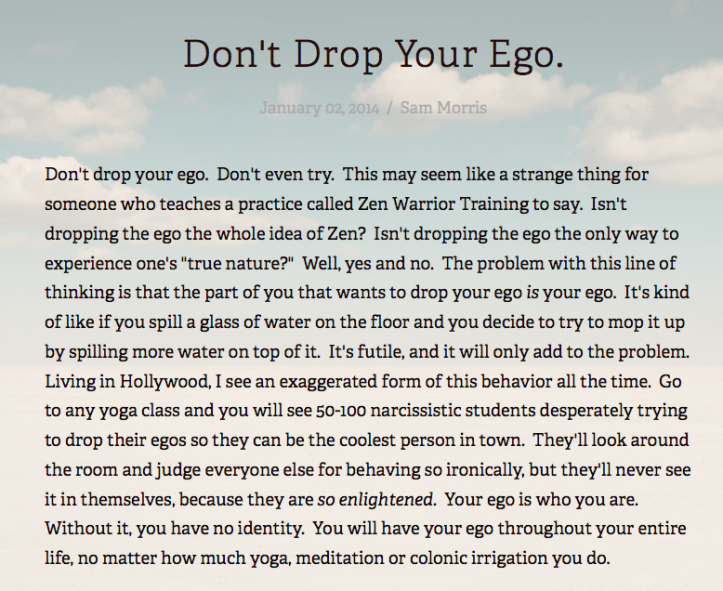 extract via Don’t Drop Your Ego by Sam Morris
extract via Don’t Drop Your Ego by Sam Morris
.
At one point I even joined the Church of Scientology. We all are now aware of the dark side of that organisation, however, at the time it was a popular and trending solution to your problems. I only stayed with them for a few weeks, and got out before my trial period (for which I paid a hefty price) ended. They kept calling me, hounding me to find out why I had left and to try to get me to come back. I did eventually tell them that what they were doing, pursuing me relentlessly in a bullying manner, to get me back was a major reason why I would never return. They stopped bothering me after that.
Why did I leave?
Because the people I interacted with during my trial period seemed as messed up as I was, and I realised that wasn’t going to make me less messed up, in fact it would mess me up even more than I already was.
And what I experienced there reminded me of my family – which was what I was trying to escape by joining them. Basically I saw that I was jumping out of a frying pan into a fire. Trying to get out of one cult by joining a different one.
.
.
That experience scared some sense into me – to this day I refuse to join groups, especially those offering an escape from the rest of society, those who are elitist even though they may disguise their elitism with false humility.
However, it didn’t put me off searching for an escape from being myself and accepting myself as I was.
I just didn’t want to be me.
I thought I was making myself into a better person… but my tactics made me rather insufferable.
A goody two-shoes can be overly self-involved, vain and selfish, egotistical and narcissistic, while they think they’re being the exact opposite of all of that. In our pursuit of something beyond ourselves… we’re doing it for ourselves even when we tell ourselves we’re doing it for others.
It’s wonderful to give out random acts of kindness, but when you’re doing it to prove to yourself what a great person you are, to show everyone how kind you are, then you tip over into vanity.
If you get upset when someone refuses your act of kindness, try to make them feel bad about not accepting your gift because it makes you feel bad about yourself, try to heal them (when you’re not healed yourself even if you think you are) without their consent, try to pressure them into being and doing what you need them to be and do for you to feel good about yourself, or go around telling others a story about how mean someone was to you because they didn’t accept your generosity, that’s kindness tipping over into selfishness.
If being kind and good becomes the focus in your life to the point of becoming what defines you, and you need others to confirm to you how kind and good you are, then it may tip over into too much self-involvement as you lose the ability to see anything beyond your need to be a kind and good person whatever it takes.
But that’s okay, you’re probably not harming anyone by doing that, and you may help many along the way…
.
.
We may also be the first type of narcissist when we’re hurt, in pain, either emotionally, physically, or psychologically.
We tend to retreat into ourselves when we’re suffering, become overly self-involved in the rawness of our agony, unable to see anything or anyone outside of us.
We may make selfish demands of others, expect them to give us what we want because we’re in pain and they’re not. We may need others to listen to us talk about ourselves, or make every conversation about our issues even when the conversation is about what’s for dinner, and force our pain to be the centre of everyone’s attention one way or another.
If they smile we make them feel awkward about doing so in our presence. If they have good news, we may make them regret sharing it in our vicinity. If they don’t feel bad for us as much as we feel we deserve, we may make them feel bad about that, perhaps just by sighing heavily and looking droopy, or making an obvious effort to be cheerful while also making it obvious that we’re making an obvious effort to be what we are not.
We may even make of our wound a badge of courage, of vainglory, of painglory, because no one is suffering, has ever suffered, as much as we are and have.
There’s even a term for this – Woundology – since it is more common than we’d like it to be – surely no one else has ever done this and if they have it surely hasn’t been noticed enough for there to be terminology for it.
.
 extract from a blurb about the book – Why People Don’t Heal and How They Can by Caroline Myss
extract from a blurb about the book – Why People Don’t Heal and How They Can by Caroline Myss
.
Although this may harm others, we may drag everyone around us into our misery, even when we’re trying not to, and they may in desperation search online for information regarding how they are experiencing you, and end up on a page about NPD, and begin to suspect that you’re the other kind of narcissist… you’re still not the other kind of narcissist, you’re just being very narcissistic, your natural narcissism has been contorted by your pain.
Once your pain alleviates, you will emerge from your narcissistic behaviour, see beyond yourself, realise how you have affected others while you were caught up in your pain, and may make amends to those you may have hurt while you were deep inside your wound.
This type of narcissist may not necessarily be the second type of narcissist, even though they may appear to have NPD to those observing them.
I’ve been this type of narcissist. I’ve been so self-involved in my own pain and suffering that I couldn’t see how it was affecting others because I was too busy seeing how others affected me.
I’ve been very narcissistic… but I don’t think I’m the second type of narcissist. It took facing some hard truths to snap me out of it.
I credit this book – Going Mad to Stay Sane by Andy White – as being a catalyst for me finally accepting who I was and am, and not trying to escape anymore, but learn to deal with my mess as it is.
.
.
I was so caught up in how much others didn’t understand me, didn’t get my story, weren’t being empathic, weren’t even trying to do any of that, that I overlooked the fact that I didn’t really understand myself, my story, as much as I thought I did. That what I saw as me trying… was actually me being trying (in the other meaning of the word).
I also saw myself as an Empath, and didn’t realise how unempathic I was being while seeing myself as the embodiment of empathy, because my definition of empathy lacked empathy and was really more about sympathy-seeking, projection and transference.
I felt everything others were feeling… but what I actually picked up in the way of feeling from others was my own projected and transfered emotions. I was owning them by proxy, therefore not really owning them at all, but making others own what was mine, then being confused, burdened and hurt by what I thought was theirs… which was actually mine.
.
.
Why did this Empath attract narcissists? Because I made narcissists out of everyone… due to needing to keep up my appearance of being the one who wasn’t me. The one who was loving kindness surrounded by a bunch of selfish a-holes. And other variations on a theme.
I was very attached to my wound and wouldn’t let go of it and the stories it created for me – which I created around it.
.
This is an interesting read – Shy, Sensitive, Introverted… and Narcissistic by Linda Esposito.
(If you read the above article – I’m an INTP, and in typical INTP style, I don’t completely agree with some aspects of this article, however, I’ve also noticed that some of those who I think have NPD, at least the ones I know personally, have claimed to be INFJ’s, so that’s why I was interested in this perspective, but I’m not totally convinced by it. It’s open to interpretation. Has some concepts worth considering. Don’t ever ask an INTP to be definite about anything… even when we are we question it).
.
It’s not pretty, but I’m proud to admit it because it frees me from my own bullshit which kept me trapped in a yucky place, a prison of my own making. I like to remind myself of that to keep myself real.
At one point I even credited myself with turning someone ‘normal’ into a narcissist of the NPD kind. I wasn’t pleased with myself about doing that… I was shocked that I seemed to have inadvertently while being kind and good to others turned someone who had seemed nice into a monster due to supporting and encouraging them to have confidence in themselves.
Some random acts of kindness really have one hell of a backfire!
Ah… inverted grandiosity!
.
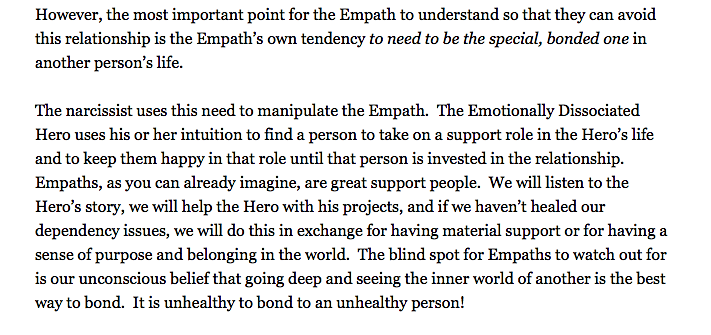 extract via The Empath and the Narcissist by Elaine La Joie
extract via The Empath and the Narcissist by Elaine La Joie
.
In recent years I’ve had to face a lot of hard truths about myself. I tried facing them before and made some progress, but I lapsed due to fear and stuff like that in previous excursions.
I’ve also had to confront many a harsh reality about others too… but those are often more connected to confronting harsh realities about myself and my tendency to transfer and project onto others things which I don’t want of myself, or look at others with rose coloured glasses while using black ones to look at myself – I have been known to paint myself black while painting others all sorts of lovely colours.
Getting to know yourself isn’t as easy as it sounds, because it also entails getting to know others at the same time. The two are intrinsically linked which is why relationships of all kinds are so important to humans.
.
.
I learn a lot about myself, and others, through blogging – less through my posts (although that can be insightful into WTF is going on inside of me, but it’s about me and not others) and more through comments and replies.
Lately I’ve been having trouble replying to comments because shit is happening offline that eats into my online time. But I like to reply ASAP to comments, let you know I’ve heard you and listened, as your comments are important to me (more than I’ll ever let on), you’re sharing yourself and time with me (and you also have shit happening offline). I know that each comment is precious. Communication is valuable.
If I sound… to hell with how I sound, that’s out of my control. And I’m not sure if that is ever something I really want to control.
.
.
Here’s an example (which inspired this post) – This is a reply I made to a comment recently with regards to the ‘narcissist’ label:
I also have the impression these days that anything which moves is being labeled a narcissist, and that even breathing is narcissistic. I think it’s a phase which NPD awareness is going through, similar to the phase that airport security is going through where everything is viewed as a weapon. When something becomes a hot topic and gets into the collective consciousness which causes fear and panic, everyone wants to be safe and in the effort to get safe people become hypervigilant and paranoid. People are seeing narcissists/terrorists everywhere.
The thing about narcissism is that it is natural to all humans. Every single one of us has narcissistic traits and behaviours. These are both positive and negative. But right now they’ve all been classified as negative. Perhaps that’s a backlash to the previous decades when being narcissistic was a goal which we were encouraged to positively acquire.
Greed is good!
Fake it to make it!
Just do it!
… and a bunch of other slogans, positive affirmations, and other propaganda trying to get us all to be the best that we could be, have it all, and do whatever we had to do to get it.
Not so long ago we celebrated narcissists and narcissistic behaviour. We loved the grandiose.
.
.
Then the giant bubble burst, and we all got injured in the debris, leaving many people very disillusioned, confused, in pain, looking for someone else to blame. Enter the narcissist as the villain of our times, the Big Bad Wolf who blew all of our houses down, who took and took and took until he destroyed the planet and left us with nothing.
You’re not a narcissist, you know that. But you’re right, you could easily get labeled as one because it is the popular accusation of the moment, used most often by narcissists and other people who get pissed off because you’re not being who they want and need you to be for them, and not doing what they’ve decided you should be doing.
.
.
I read a post on an NPD blog awhile ago which centered around a commenter who the blogger had decided to ‘out’ as a narcissist. They included the comments this person had made which the blogger thought proved that they were a narcissist.
I could not see what I was being told to see, what I actually thought at the time was that if anyone was being a narcissist, it was the blogger.
The commenter had gone to the blog for help, they had shared their painful story (which is not easy to do and many people find commenting on a blog a difficult thing to do).
The blogger is one who considers themselves empathic and empathy very valuable, yet there was no empathy shown for this commenter from the blogger or anyone else. The mistake the commenter made which eventually led to them being branded a narcissist in public was to question the blogger on a certain point which the blogger was pushing as being crucial to recovery. They had been logical and reasonable in their questioning, their comments seemed fair, they were being emotional but considering their story and the subject that makes sense. The blogger took umbrage, and rather than let the point be a moot one, the blogger kept arguing from a basis of I’m right/you’re wrong and I’m going to make you accept it.
There were a bunch of comments on that post which had an element of witch hunt. A narcissist had been found and the pack closed ranks, going in for the kill. It was rather disturbing because up until then I’d thought this blogger was levelheaded. However, when you blog about NPD, and if you get attention for it, it’s frighteningly easy to go on a power trip, and the victim of a narcissist who started a blog because of their own experience may tip over into being a narcissist themselves (living out Nietzsche’s warning about monster hunters).
.
.
Hopefully the trip to the narcissist side only lasts long enough to learn something from the experience, an insight into NPD, but not so long that they never emerge.
I don’t think anyone in that scenario was a narcissist, they just got caught up in a situation which got out of hand, which triggered their respective pain, raw and angry, and the pain did the talking.
Pain is narcissistic, and when we’re engulfed by it we may behave narcissistically. But that does not a narcissist make. It does however give us insight into what it is like to have NPD, and why they do a lot of what they do. Through our own narcissistic behaviour we can understand those with NPD, but our narcissistic behaviour does not mean we’re narcissists. And it doesn’t mean that others who are behaving narcissistically are narcissists.
Someone with NPD may look the same as someone being narcissistic, but they are not the same. Not everyone who looks like Bin Laden is Bin Laden or is like him.
.
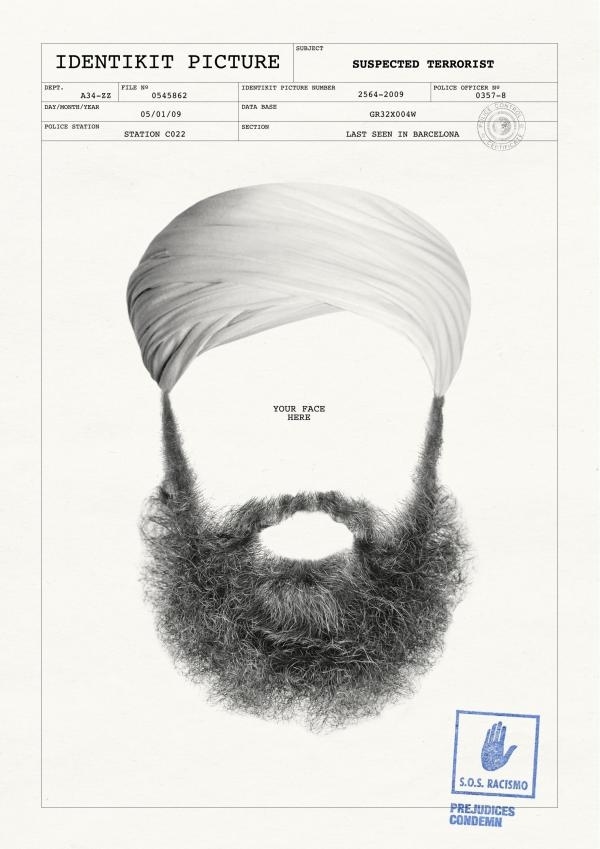 image via The Strongest Anti-Racism Ads of the Last Twenty Years
image via The Strongest Anti-Racism Ads of the Last Twenty Years
.
And not all narcissistic traits and behaviours are a bad thing. Many are actually good and useful.
Most things have to go to extremes before a balance is found, and I think that’s what is happening now, we’re visiting an extreme. Balance will come. We’ve been to the Me Me Me end of things, now we’re in the You You You end of things, at some point we’ll get to the Me and You part.
In the meantime, if someone calls you a narcissist, thank them for the information (about them and their view of you), and stay true to yourself. And if you’re the one calling yourself a narcissist, thank yourself for asking the question as you’ve just shown yourself that you’re not.
.
.
In my view someone with NPD is very different from your friendly or unfriendly neighbourhood narcissist.
My view comes from growing up with parents who could be labeled as – Malignant Narcissists – to distinguish them from non-malignant ones. I’ve called them that in a few posts. I felt awkward when I did that as I didn’t label them as narcissists of the NPD kind with ease, in fact I tried desperately not to do that even though I knew that they were… I really didn’t want them to be that.
I left myself open to their abuse longer than I should have. I stayed in the abusive relationship when any sane person would have left… or at least that’s what sane people tell others to do when others are in an abusive relationship. The empathy of sane people is lacking personal experience sometimes. When sane people end up in an abusive relationship… then they are sometimes less hasty to tell you to get out because they then know how hard it is to actually do what is so easy to say.
Its’ so easy to say things… doing them is so much harder.
.
.
Compared to my parents… most people, no matter how narcissistic they are being, aren’t narcisisists of the NPD kind.
When someone is behaving narcissistically, my first thought isn’t – Oh, shit, they’re a narcissist! – it’s – What’s going on in their lives to make them come across that way? – and I check with myself first to make sure I’m not the one being narcissistic in my perception, which can totally happen, more often than I would like for it to happen.
It’s very easy to make what is going on with someone else all about what is going on with us, or make what is going on with us all about someone else, and then make them the cause of our own issues. They could be adding to our stuff with their stuff, but are they really the cause of it?
Hard to tell or difficult to face sometimes.
.
.
So, in non-conclusion…
What is a narcissist?
What do you think?
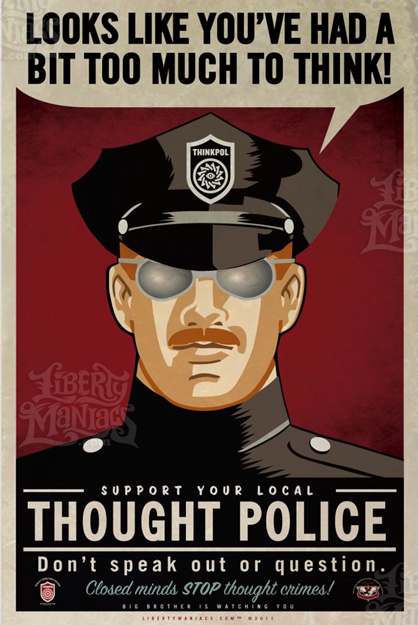
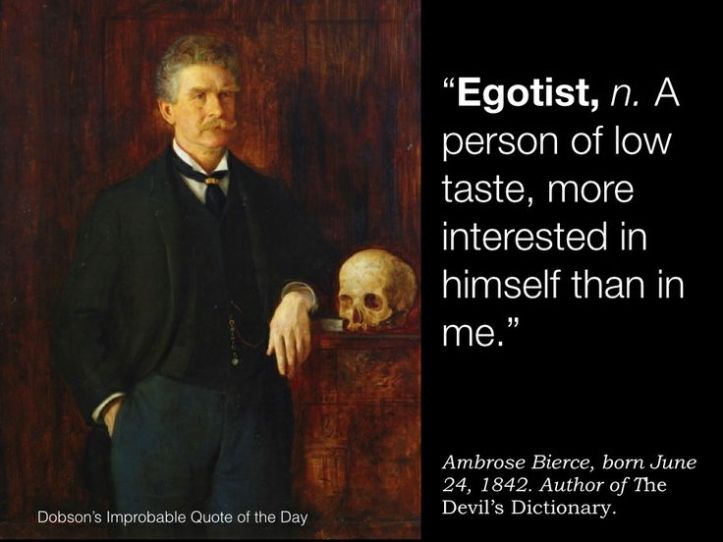
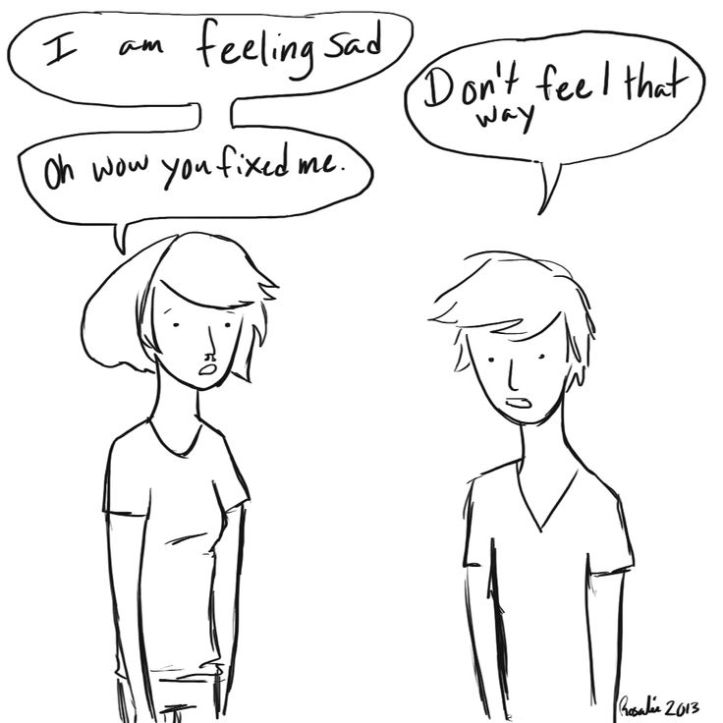
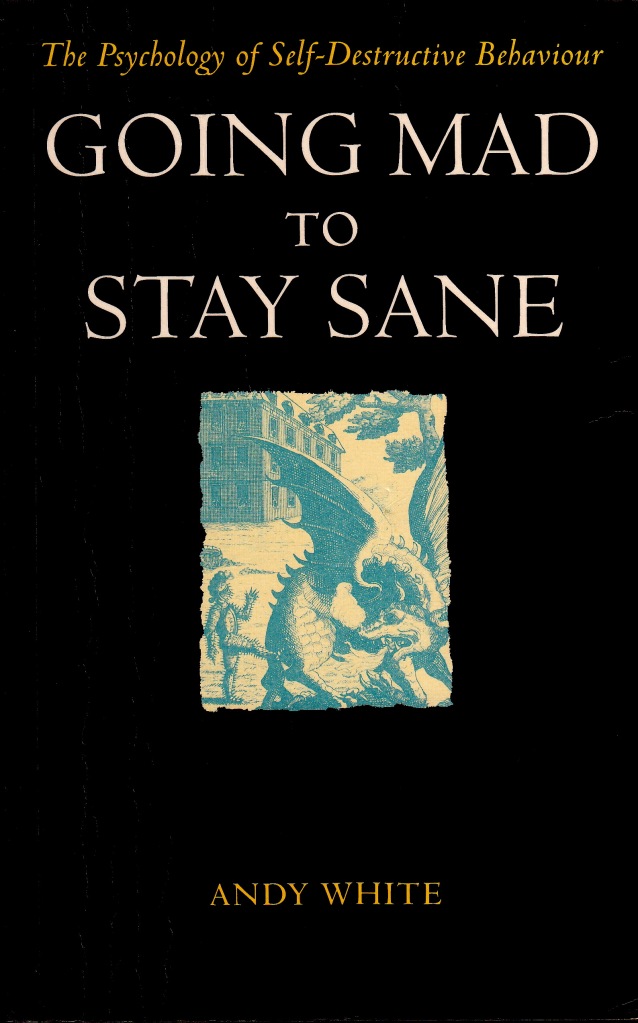
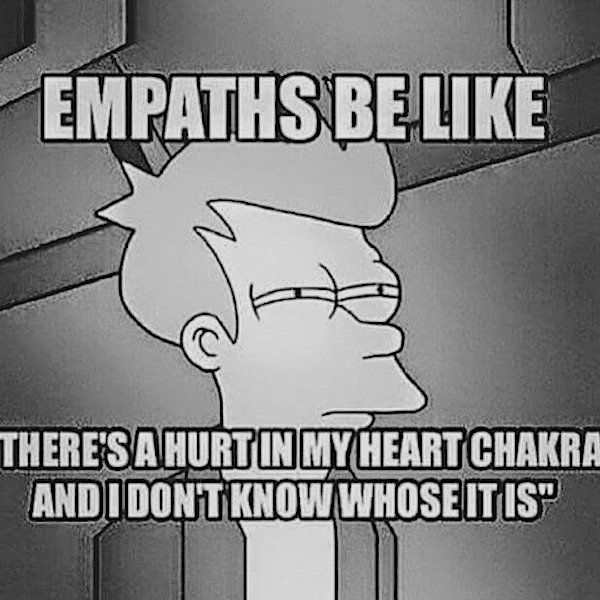
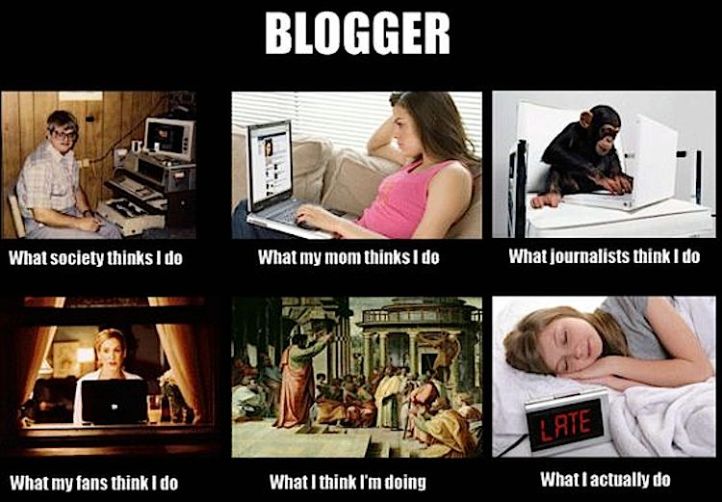
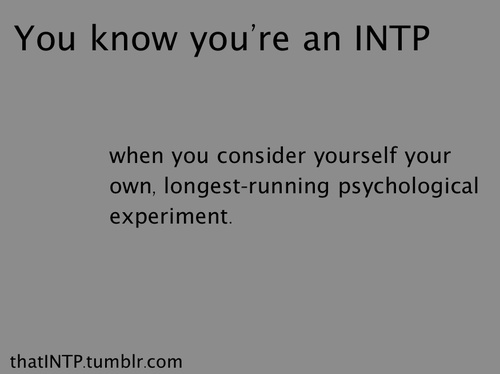
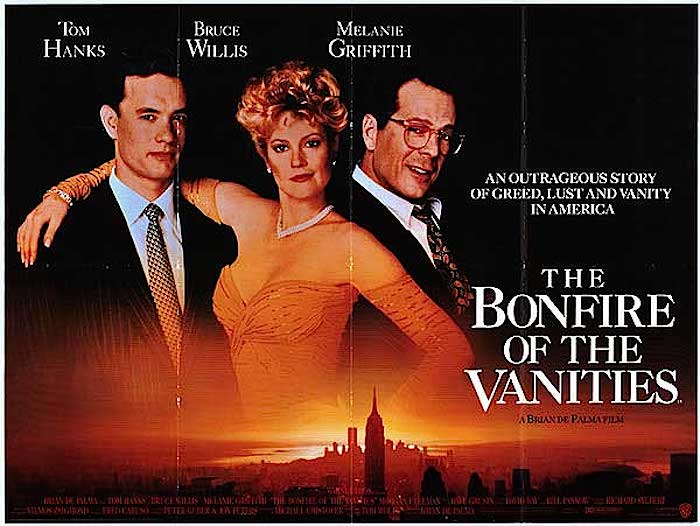
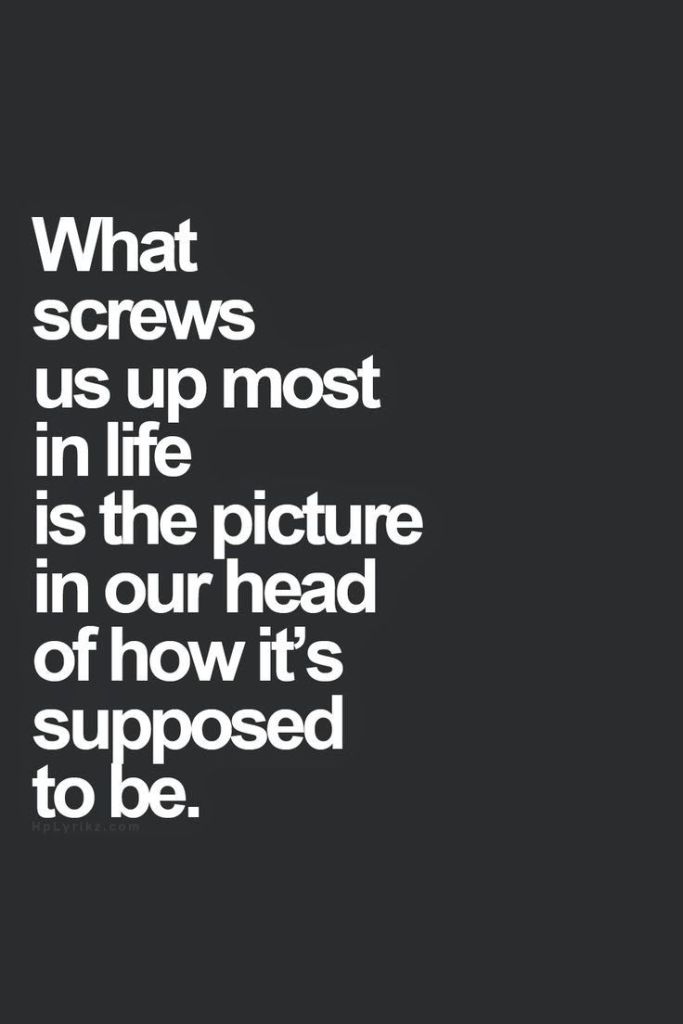
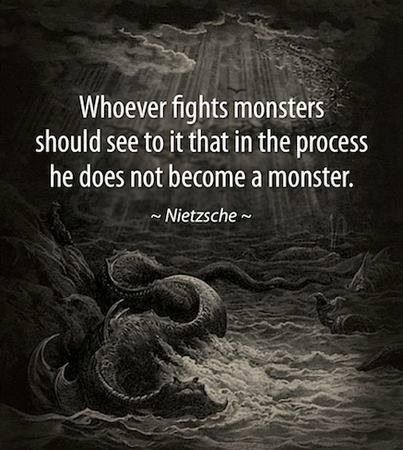
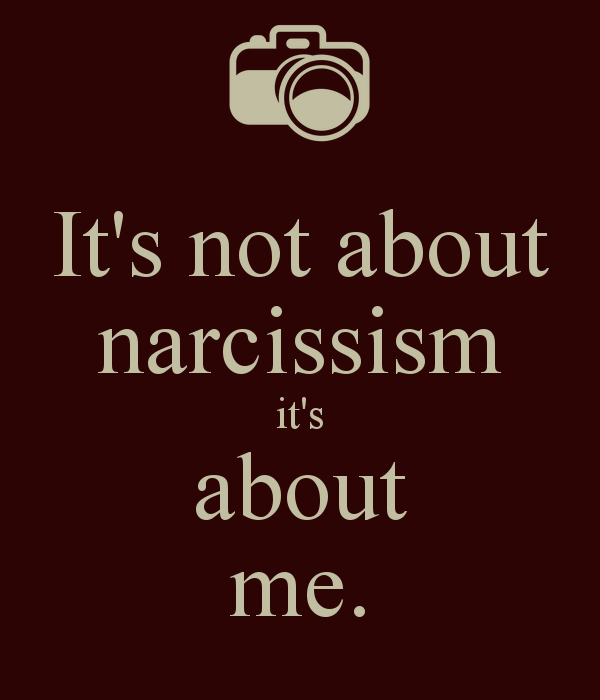

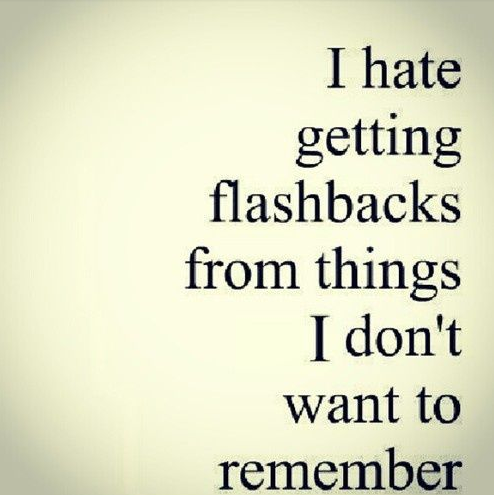
Before I started to change my life, I had a narcissistic friend who fit this quote quite well,
“The truer mark of a narcissist is absolute clarity about a situation, and an undying commitment to his or her opinion. “Look for an unwavering certainty (‘No—that’s just wrong. Here’s the truth’), name-dropping, attention grabbing gestures, breathless monologues, constant interruptions, and above all, a disagreeable, arrogant style.””
He would ramble on and on and on and on . . . . . and he wouldn’t let others or I get a word in. And he had the absolute authority over which media was truthful, political party was good, which nation was the best in the world, etc. And near the end I started to challenge his nonsense and it was one hell of a sight to see him rage under examination of his beliefs. And with him like the other narcissists who were in my life, they have this strange way of seeing everything in black and white terms, there are no shades of grey with these people.
LikeLike
Thank you for sharing 🙂
You’re spot on about the verbal diarrhea, my goodness can they drone on and on and on, it never ends. It’s a monologue, they don’t do dialogue. Tbh, I grew to look forward to the silent treatment, even if it was horrible, because at least they’d shut up for a while. And their temper tantrums when questioned.
The other thing they tend to do is do a 180 on a position, especially about people. One moment they hate someone, and go on and on about how awful that person is, listing the crimes and sins that person has committed against them, trying to convince you to hate that person too. Then suddenly they love that person, they’re the best friend they have, everything they do is wonderful, and if you mention that they hated them, they’ll deny ever having done so, and you are mistaken, perhaps you’re the one who hates them and that makes you the bad guy.
My mother had this pattern of villain/hero to her damsel in distress. She’d find a hero to save her from some dragon, but then if they actually tried to kill her dragon, they’d suddenly go from being a hero to being a villain, and she’d move onto the next hero who she needed to save her from the villain who tried to kill her dragon.
You’re right, they’re very black and white in their view of the world, and about their public persona, however, they expect others to put up with their grey areas, to never have these questioned, while they never put up with the grey areas of others.
Exhausting people to be around.
LikeLiked by 1 person
“what screws us up most in life is the picture in our heads of how it’s supposed to be.” sooooooo true.
the big, red flag i watch out for is the inability to tolerate criticism/be wrong/apologize. this one really sets off alarms with me. humans are imperfect. this is a fact. therefore, if a person actually believes (or, they just really, really need you to believe it, so they can believe it) that they are an exception to this rule, this person is clearly not dealing in reality. might not be npd, but, something is ‘off’ about this person. proceed with extreme caution, and be prepared to run like hell. (i’m referring to a pattern of behavior, of course, not just a single incident in which someone might have been having a really bad day, or something.)
LikeLike
That is an excellent point! Definitely a red flag to watch out for, and once spotted to heed the warning it’s giving because otherwise we end up walking on eggshells, censored and controlled, tied up in knots and suffocated by their hypersensitivity.
I was watching the film Margot at the Wedding the other night and in it Nicole Kidman plays a narcissist who turns up at her sister’s house (which she keeps referring to as ‘our’ house), and gradually spreads poison, doubt and misery, constantly criticises everything and everyone, and perceives anything anyone says to her which doesn’t fit what she wants to hear as a criticism which then requires an apology. When others ask her to apologise she of course uses the faux apology which is actually another criticism. I loved a scene at the end where the sister confronts her and says – I can’t have anything, can I !?! You won’t let me have anything!
LikeLike
margot at the wedding! i just recently came across that book on goodreads, and, after reading the plot summary, added it to my to read list. something about the story got me, of course:) didn’t know there was a movie.
LikeLike
My ex-N definitely fit that description. He was an absolute authority on a number of things and frequently ranted about them. The arrogance was extreme and VERY disagreeable. The surefire way to empty a room was to have him enter it and start foisting his views. This is a very good definition.
I have been narcissistic, as well (as you know). Breaking out of that and recognizing it for what it is is hard difficult work and there are no easy answers. And we live in a society that promotes easy answers. Lose 10 kilos in one week!!! Join (insert religious group here) and turn yourself over to god!! Get botox!! You know what I mean. As humans we have a natural tendency to narcissism and then we are often encouraged to go overboard with it. That’s where it’s up to us to make sure that we’re self-aware, that’s we’re not diving into a narcissistic morass.
Good post. 🙂
LikeLike
Thank you 🙂
That’s an excellent point about the promotion of easy answers. One of the things I love about technology these days is that for the most part you can avoid adverts online or on TV. It’s such a blessed relief! When I used to watch TV with adverts I found myself getting brainwashed even when I was aware of it. They sell you miracle cures for everything in one quick easy step of buying a magic product. This hoover will rid your home of every peril. This food will cure you of everything and you will never be ill again. This car can fly you right over all traffic and it’ll drive itself too. This toothpaste will turn your teeth into diamonds. This cream will give you the skin of a photoshopped model.
Narcissism is a great supporter of imagination and creativity. Like one artist said, if he didn’t think he was a genius and his work unique he would never bother painting anything or trying to make a living from it. It gives us the push to do stuff, be stuff, and get attention for it. It has a positive side which is great – it has the potential to make us live our dreams. Its negative side on the other hand has the potential to make us live our nightmares.
As long as we’re aware, self-aware and open to self-reflecting, then I think it mitigates some of the damage which may occur. The problem with those with NPD is that their self-awareness is shallow, and their self-reflection needs another person acting as a mirror, and they only want to know if they’re the fairest of them all, otherwise the mirror gets broken.
We live and learn!
LikeLike
So true. I have never swallowed ads very much, but I found them completely annoying because they always interrupted the story so much! 🙂
LikeLike
Yes, I’ve had moments when I couldn’t recall wtf I was watching because the adverts went on so long. In some ways a narc fills our head with adverts, and we forget ourselves, our story. The adverts become the story.
LikeLike
PS – don’t worry about not responding promptly (here I am, telling you how to feel). I figured that you had (have) stuff going on. As you tell so many others – be gentle with yourself. 🙂
LikeLike
Haha, Thank you 😀
That little bit about responding was just an inner conversation leaking out of me into the post. I was going to edit it out but then I didn’t. As I was writing the post, the orange comment icon turned on, so I clicked it to make it go grey, and it came on again shortly afterwards, and I knew I had some comments I hadn’t answered, and it sometimes takes me ages to write a reply because I pause to think… and I’m a worrier and I’ve created a worry for myself about replying to comments. I know others don’t expect anything from me, this all my own doing 😉
Speaking of having stuff going on – How’s the move going? Are you there yet? What’s happening with you?
LikeLike
I understand. 🙂 I tend to worry, as well.
I have moved and started my new job although at the moment I’m in a long-stay motel. No furniture or place to call my own until November. It’s been pretty exhausting but I like my new job and the people I’m working with. At the moment I’m really missing my M and can’t wait for him and my dog to get here. Very glad I came, though. 😀 Thanks for asking. How is it with you?
LikeLike
It’s quite a good way to do the move, in stages rather than everything all at once. It’s a bit like resurfacing after a deep dive, it needs to be done bit by bit so as not to get the bends.
And you get to look forward to your loved ones coming and moving into a new place, which adds to the excitement of it all. You get to savour each part of the process, which is delish!
So glad to hear the new job is awesome! 😀
Everything seems to be moving forward at my end, I’m keeping myself in a slight daze to keep stress levels down. It won’t be real to me until it is real 😉
LikeLike
Wow, you’ve done some serious self-reflection. It gets overwhelming sometimes, but I enjoy your shares because it makes me do the same. I’m sorry I projected my pain upon you so much. I was just so devastated and desperate in navigation. I used you as my life raft too much, instead counting on myself. I just felt so crippled. I understand it now, although I still don’t want to much of the time. “Stay calm, and love Jason Stratham” 🙂
Thank you for sharing.
LikeLike
Thank you 🙂
Self-reflection is an important part of recovering from a relationship with a narcissist, as it helps to free us from the inner ties which bind us to them and to the situation. When we go within we find ourselves, who we are, what we have as resources within us, it allows us to access our personal power which is vital as when we’re caught up in the hell a narcissist creates we often feel utterly powerless and that can makes us more crazy than the narcissist ever did. We need to see that a lot of the power which the narcissist has over us isn’t their power but ours, that we’re responsible for allowing them to get to us, to manipulate us, to hurt us, and therefore we have the ability to turn things around and shut them out.
It can indeed be overwhelming, often because we have to face how much we let them do what they did to us. That can lead us to blame ourselves and pick on ourselves in a self-defeating manner, which is why it is vital to be gentle with ourselves.
Once I realised the extent to which I was allowing my parents to do to me what they did, that I kept offering myself up to them to hurt me, I got very angry with myself for doing that as I saw it as being the ultimate self betrayal, but gradually I saw that if I accepted my part in the pain, I could finally learn how to protect myself, get out of the dynamic, and change the course of the story.
It also helps to recognise our own narcissistic tendencies as this can give us insight into the narcissist in our lives and bring the kind of understanding which alleviates much of the confusion. So when we ask – Why did they do this? – we can answer from a personal point of reference rather than rely on others to answer our questions for us which may never truly satisfy our search for clarity.
Real knowledge comes from within, and we have to go within to get it.
It takes time, and it can’t be rushed. There is so much going on inside of us, and getting to know ourselves requires patience and dedication to doing it.
We sometimes come to rely on others to support us, and it is great when we have the support of others, but this can become a crutch which makes us unable to support ourselves. It’s important to find the support within, to see how much we can do for ourselves, and to be there for ourselves. To see how strong and vital we are.
You’re strong and intelligent, totally able to Jason Statham it, you just need to keep seeing that and exploring all the wonders of the world within, of you as you are.
Take care of yourself!
LikeLike
I think the best way to tell if someone is a narcissist is, if your life goes to shit every time they’re in it. Every time I let her back in, I lost a little more, until there was nothing left for her to take. She was just so dem good at preying and portraying herself as the damsel in distress. This was my greatest weakness. I had a shitty childhood. Mostly neglect, and still not quite too sure if narcissm was involved. My older brother shows some very strong traits. However, I never wanted anyone to feel the way I was made to feel, so I’ve gone out of my way to do so for people. My bad. Lesson learned. Loving me will come first for now on, but I still won’t allow my compassion be lost. I’m done beating myself up about it. She is what she is and will continue to do what she does. No changing this fact. Acceptance has finally arrived. The only “damsel in distress” I’ll be rescuing is my lil one. She’s my inspiration. Thanks for the shares and care.
LikeLike
Thank you for sharing 🙂
Yes, that is definitely one way to tell. It’s the ‘black cloud’ method. If it’s a sunny day in your world and suddenly there’s a thunderstorm because a certain person appeared, they’re carrying a black cloud around with them, and the storm follows them wherever they go.
It takes a while to figure things out, but once you do it improves the quality of life and other relationships. Narcissists can make us appreciate the good people in our life, and that includes ourselves.
Take good care of yourself and your lil one, both of you deserve lots of love and many great experiences!
LikeLike
Love this ❤ The quote by Elaine La Joie that you included really spoke directly to me. I learned quickly as a kid how to bond with people at a deeper level in order to make connections and make friends (we moved every 3-4 years). I do go deep with people because of this and also my interest in others- I like learning about people- I'm curious by nature. I have since realized that (post my relationship with a narcissist) I should be cautious with this trait but at the same time I have realized that I love this trait. It's one of my biggest strengths. I am choosing to keep this strength & be proud of it versus deciding to stifle it and live in fear that it will be exploited again. Most people are good. I know for a fact that you (Ursula) have been a catalyst for me thinking this way- I have in many ways turned the tables on my my ex narc friend- her way IN to getting me invested (bonded) to her, I have used as my way OUT and I will now let this trait shine even brighter than before 🙂 So sweet, thank you
LikeLike
Thank you very much for sharing, that’s wonderful 🙂
Someone recently asked in a post on their blog – What is the best way to be attractive to others? – and it got me thinking. Being curious and interested in others is a very attractive. Most people like it when others are interested in them, it definitely creates a connection, and it usually creates a mutual flow of interest which makes for a great interaction. It’s fun and if it’s something you do naturally, then it’s going to attract many people to you, most of whom will be great to get to know.
It will also attract narcissists who expect everyone to find them fascinating, they love for people to be interested in and curious about them, although unlike other people they want to control your interest and curiosity, focus it where they want it focused and keep the spotlight away from what they’re trying to hide. They get aggressive if you find something they’re not prepared for you to find out.
Narcissists often come on very strong with a show of interest in other people, which is why they’re so good at drawing us in, but their interest and curiosity is different. They want to get inside your skin rather than get to know who you are.
They often end up making us hate what is naturally beautiful about ourselves because they take it and twist it into something ugly. It takes a while to restore our faith in ourselves and in others after that kind of experience, but when we eventually do our appreciation for our natural selves, and for the non-narcissists of the world increases and strengthens, and its much harder for a narcissist to do what they do to us.
Let yourself shine, and you’ll be fine 😀
LikeLike
Thanks for your reply Ursula, so true ❤ So to answer your question, what is a narcissist? They can be hard to spot, unless you are looking. That's how so many of us have got entangled with them…they hide well & can distract anyone. They bring you to your fantasy land of irrelevant facts & jargon and their bullshit talk (you didn't know it was that til later) is entertaining…at first. Then you spot inconsistencies in talk and behavior. When you question them, it's never a straight forward sensible answer (especially if you catch them in a lie), be ready to pay. I caught her in many lies-small dumbass ones really-I didn't know people lied about dumbass shit. But they zap your energy so bad that after awhile you give up and stop questioning their lies- its too much work. It becomes easier to just keep your mouth shut & do nothing. I recall catching her in a lie…and I called her out on it. She was passive aggressive in how she'd f' you over for calling her out. It was like she was saying- "why would you question me?- I'm innocent. And you're just being annoying." Well I am annoying when you mess with me and think I will believe it all. Many people don't question her- they just nod and agree…they are tired too…nodding and agreeing works & it ends the fight. So maybe one of the biggest things that may indicate you are with a narcissist, is how TIRED you feel after being with them. Drained & sucked dry. You will see a glint in their eyes when they see this in you- they now have control. It's a weird dynamic but hard to explain or warn others of since you almost have to experience it to understand it. So that was lots of rambling…ugh
Also your point about selfies & pictures. Her profile pic on FB (I can see on old messages on my FB site) is her face semi turned away from the camera with her mouth semi ajar, and her hair tumbled in a messy bun…it had a Cosmopolitan magazine, movie star, seductive & mysterious aspect to it…made me laugh when I saw it since she's a middle aged mom and it looks foolish in many ways. If I were to guess her kids took it- even more creepy to me with the way she was presenting herself. Anyways- just thought that was interesting since you mentioned the selfie/picture deal and people with NPD.
LikeLike
That’s brilliant, thank you very much for sharing that!
The – lying about dumbass shit – is a very big deal for narcissists. It’s not dumbass shit to them, it is for the rest of us but they really don’t get how the rest of us think and feel or anything. I’ve scratched my head raw to the point of bleeding because of it. It’s completely WTF! Why are they lying about this!?! It’s ridiculous! And it’s a very good red flag if you spot it, but it can be so inane that we just can’t register it as a warning. It’s also too humorous to take seriously… which trips us up with narcissists as they are humorless.
They take the ridiculous very seriously. There have been a couple of times when I’ve only cottoned on to someone being a narcissist because they’ve lacked all sense of the ridiculous.
I once made a flippant remark which sparked a massive drama. I still can’t quite get my head around it, even while knowing Narcs make no sense. No one I’ve shared the story with can figure out why something so irrelevant became so seriously important. I basically said – who cares – and that triggered narcissistageddon. As it often does.
It’s the little things which give narcissists away the most, but we’re used to ignoring the little things because it makes life easier when you’re dealing with most people, including ourselves. Perhaps it’s the narcissist’s inability to let a triviality slide which should ring the loudest warning bell. But it can be so ridiculous that we just can’t believe anyone would be that petty.
The selfie thing is fascinating because many articles online see all selfies as a sign of a narcissist. However, that view is subjective. People who don’t like taking selfies are going to view people who do as being narcissistic. Sometimes it is a real narcissist who is the one that is labeling selfie-takers as narcissists because those people are doing what a narcissist fears the most – exposing themselves openly to the judgment of others without controlling and censoring it.
The narcissists who I know personally would never take a selfie and share it as is, if they did it would have to be under very controlled circumstances and the selfie would reveal very little.
Narcissists tell us they’re narcissists in the way they behave, speak, and such… it’s just so subtle and sometimes so silly that we ignore it. They benefit from our natural humanitarian urge to cut others slack because we need slack cut. But with them cutting slack is a noose which may eventually try to strangle us.
LikeLike
I love you! “Subtle & silly”…that’s it. They do so many things that are silly but not meant to be-it’s just who they are, which in many ways makes them entertaining but that changes quickly when you become apart of their skit.
A quote about nooses came to mind when you mentioned the word noose. She posted this long ago on FB. “Be aware that a halo has to fall only a few inches before it becomes a noose.” So true. Mine knew she was disordered (some personality disorder maybe) to some degree. She didn’t want to be this, she preferred calling herself a sociopath since it was more unique & freaky sounding and a “disease” according to her…but I can say with pretty good clarity that she was a person with NPD. It’s not unique, it’s not special, it’s sad. Glad they don’t have the same range of emotions to really realize this. That makes it easier for a non disordered person to move on- they will never change & don’t have the insight to. Feeling sorry for them is not worth much either- I feel sad about her life being like that but not sorry for her. She doesn’t know any different, and I know she knows she messed with me but she could never understand the scope or depth of it. Hence leaving them alone by themselves is best, if that can be done- many people can’t do that which I get too. It’s messy stuff.
LikeLike
That’s also an excellent point! Feeling sorry for them… that’s another way they reel us in.
Many years ago there was a very popular book – The Celestine Prophecy by James Redfield – which was a new age mishmash of psychology and mysticism packaged as a readable weird and silly story. It was very silly, especially the ending, however, there was one bit which was clever. The author split people into 4 basic ‘control dramas’.
This is an article about that – http://www.relationshipspecialists.com/media/the-four-control-dramas-from-the-celestine-prophecy/
This is an extract from the article about the control dramas:
Intimidators steal energy from others by threat.
Interrogators steal it by judging and questioning.
Aloof people attract attention (and energy) to themselves by acting reserved or withdrawing.
Poor Me’s make us feel guilty and responsible for them.
The only one I could recall (until I looked it up today) was the ‘Poor Me’ because at the time I read the book it struck a chord about my mother and gave me insight into something I hadn’t really understood about her until then.
We tend to be more aware of the Intimidator, Interrogator, Aloof, side of the narcissist’s control tactics, but may overlook the Poor Me side, especially when it is hiding behind the others. What keeps us most in their thrall, and makes us most vulnerable to them, is the fact that even when they are at their worst, they’re still pulling at our heart strings. Even when they are at their most abusive, we may find ourselves feeling sorry for them. When they hurt us deeply, a part of us knows they’re doing it because they’re wounded.
So to detach from feeling sorry for them is an important part of our release from the entanglement. It is also one of the most difficult aspects of our relationship with them, particularly is we value our humanity. To separate ourselves from them we may have to sacrifice how we view ourselves. We’re basically asking ourselves to not care. If we are a caring person, this can be anathema to us and may trip us up repeatedly. Keep us tied to them longer than we know is healthy for us.
They rely on that and use it against us to keep us stuck with them, sometimes they do this consciously and deliberately, but mostly I think it is a subconscious survival instinct of the disorder. I don’t think they’re are clever as we think they are, I think we like to see them as being more conscious of what they are and do than they actually are because it absolves us of certain things of which we don’t want to be responsible. And that keeps us stuck to them even after we’ve gone NC. But once we take responsibility for our part in the relationship, then we can do what is necessary to be free of them, and also not get caught up with another narcissist.
We live and learn, and sometimes it’s painful, but it can also be fun, liberating, empowering 🙂
LikeLike
Thanks for your response and the link…interesting! And I love the line about “once we take responsibility for our part in the relationship, then we can do what is necessary to be free of them.” Time does heal and makes you look at things with more clarity & rationality. It allows reflection once you are ready to do so. But no one can tell you when or how, it’s your deal. Thanks for always being so encouraging & allowing others to heal at their own pace- you are patient & have a gentleness about you…just love that ❤
LikeLike
Thank you very much ❤
LikeLike
just read that linda esposito article. really interesting. it’s funny, i just read an article about a member of a band of which i am a fan. according to the article, this person is an infj. i wasn’t familiar with the infj traits, so i googled them. some of the traits immediately made me think of covert narcissism. of course, i noticed what you said in parentheses, after your link to the article. do you think infjs are actually narcissistic, or, is it that their actual characteristics happen to be similar to the tactics used by covert narcissists? so interesting and coincidental that you linked to that article and made those comments, after i read the article about the bandmember. weird.
LikeLike
I don’t think that real INFJ’s are narcissistic. They are supposed to be one of the nicest types.
“INFJs are caring folks and good listeners to boot. Kind and affirming, they make others feel safe around them and tend to have a good many insights into people. … They seek to display warmth and authenticity in their creativity and day to day interactions.” – http://oddlydevelopedtypes.com/INFJ
They are also supposed to be the rarest MBTI, with only a small portion of the population actually being of that type. Which would make it ‘special’ and I wouldn’t put it past a narcissist to claim to be an INFJ without taking the MBTI test because they would want to be the rarest and most special type.
If they did take the test a narcissist would answer it based on how they see themselves, who they want to be, and the description of an INFJ fits the delusions that covert narcissists have of themselves.
Since the test requires the person taking it to assess their own personality, and basically describe themselves… we know how accurate and truthful narcissists are about that, and how good they are at self-reflection. Covert narcissists tend to think they are saints, empaths, sensitive souls who are good and kind (it’s everyone else who is bad). They’re special and rare rainbow snowflakes, so they must be INFJ’s, right 😉
Certain descriptions of an INFJ are very similar to Covert Narcissists, I’m wondering perhaps if the descriptions of INFJ’s have changed due to covert narcissists identifying themselves as that type (and as usual confusing matters for everyone else).
There are a couple of MBTI websites which mention possible disorders associated with types.
This site links INFJ to Depressive and Narcissistic – http://www.celebritytypes.com/infj.php
Whereas this site links INFJ with Avoidant – http://www.deepspirits.com/mind/personality/personality-type-counselor.php
It’s an intriguing way to explore things, perhaps get a different perspective, but it’s very subjective. The views of types are seen through the eyes of types, and certain MBTI types don’t get along so they’d see each other differently from those that do get along. For instance my type, INTP, finds emotional types to be too sensitive and emotional types find the thinking type like mine to be insensitive.
This is an amusing and insightful site, the test is fun – http://insightgame.org/game.php
LikeLike
Thank you, Ursula.i am an INFJ and I hesitated a lot before writing, as I felt that sort of labelling as an equation to N type. The trouble with diagnosis and classifications is that we can point our finger at people even when it’s not the case. When I did the test i didn’t have any program to show or to assess, I just answered the questions as honestly as I could. I do not think that evrything must always be a plot against someone, to convince others… But definitely there is a link to depression.
LikeLike
Thank you, Seashell 🙂
I was worried about real INFJ’s being affected by this. I probably should have been clearer in my post about what bothered me about that article and the link between this MBTI type and narcissistic tendencies.
It’s typical of narcissists to hijack the best and make it the worst. To dilute the rare by flocking to it due to the impulse of their disorder, the desire to be ultra special, and making it theirs en masse thus making what is special not the kind of special it actually originally was.
Real INFJ’s are lovely souls, as you are. You’re also rare types who prefer to remain hidden from view as attention is not something you seek, even though you may like a bit of attention, you are selective and careful. And prefer to give than to get.
And, of course, narcissists, especially covert ones, would want to be this type although they are far from it. There is a big difference between wanting to be a type, claiming to be that type, testing as that type to support self-delusion, and actually being that type. Narcissists can cheat at any personality test even if the test thinks it can’t be cheated. If the test relies on the honesty and self-reflective ability of the taker… well, it’s asking for a narcissist to mess with it.
Narcissists want to be types like INFJ’s because it’s everything they are not and desire to be. Those who are actually this type are not narcissistic at all, but the type has been invaded by covert narcissists.
Browsing online – INFJ’s have suddenly become one of the most popular types, the one lots of people claim to be – yet statistically it is the rarest type. Something is amiss. Fee, fi, fo, fum… I smell narcissist shenanigans.
You’re not a narcissist, you know that. However, if you’re an INFJ you’re more likely to shoulder the blame for something which is someone else’s fault because you’re trying to be fair, be caring and sensitive… this is natural for you. Sometimes it is better to be unfair, less caring and sensitive, but real INFJ’s don’t have that kind of filter. How can you filter who you really are?
I think, as far as depression is concerned, it can affect anyone, so linking it to an MBTI type should really come with a disclaimer. My type, INTP, is linked to schizotypal and schizoid – schizoid is fairly accurate for me. But these things have to be considered as part of a whole, and a type is just a summation which may end up excluding the individual human factor.
Sei bellisima come tu sei!
LikeLike
sorry, seashell. i didn’t mean to offend anyone. i only meant that the characteristics of infjs seem similar to the behavior of narcissists. i meant that totally objectively. i wasn’t indicating that that’s what i personally believe about them, and, i wasn’t trying to make it seem as though that’s what you thought either, ursula. i was just wanting to discuss the reasons why covert narcissists’ behavior seems to mimic the personalities of infjs. i actually was taken aback by the way esposito called infjs out the way she did. i should have explained that better.
ursula, you’re probably right!
LikeLike
thanks for the links, ursula. i have always found the myers-briggs types thing interesting and fun. i have never come across sites that link the types with possible personality disorders.
LikeLike
They are fun and informative as long as we keep in mind how generalised that kind of thing is, and how often what is written reflects the writer more than the person they are writing about in the description/interpretation. That’s one of the things which struck me the most about ‘People of the Lie’.
It’s nigh on impossible to remove personal bias from things like that as those who study personality types and psychology, etc, and who do it professionally, have personal reasons for doing so. They may be using others to work out their own inner stuff, and they may do it without realising they’re doing it. Such is being human.
LikeLike
Hi jborn, don’t worry, i have a problem with words and labelling due to my personal history, this is a good place for me where I feel I can express myself.
LikeLike
Dear Ursula,
we have never met and probably we’ll never meet but your words always touch my heart as you had known me for ages.
It’s a very bleak moment, you know those those thoughts in the tub…i do not personally see being an INFJ as an auspicable type to be, you swim in blame and you doubt you have hurt people even though you haven’t;being caring when it’s the result of Nparents is not the same as a natural and balanced disposition of the soul. Since a very early age being train to fear and anger which can be addressed at you for no reason, then you end up finding a shelter where you can, how you can. And you become allergic to lies, cheating, appearances, words..
LikeLike
Dear Seashell,
Everything which brings pain can also be what gives us pleasure. The two things are intrinsically linked, two sides of a whole. It’s just really hard to see that when we’re deep in an ocean of pain, drowning in it. Sometimes when we stop struggling… that’s when we float free, and are carried by a gentle tide to find our footing on dry land.
Growing up with N parents has made you a very sensitive soul. If you were born naturally gifted with extra sensitivity, then this is the harshest environment to grow up in because narcissists are the least sensitive to others and most hyper-sensitive about themselves in a way which makes of sensitivity a negative and bad thing.
Your parents basically set an example for you in every way possible about the horror of being sensitive.
They taught you nothing about the beauty of sensitivity. It’s up to you to teach yourself that.
Look at how strong your sensitivity actually is. It’s not weak or weakness at all. Those who are highly attuned to their senses must discover how strong they are, how naturally balanced they are because of their ability to feel so deeply every vibration in the world and in others.
You have the key to that in your appreciation of the beauty in and of others, in art, philosophy, music, etc. The most sensitive souls are sometimes the most tortured souls because of their sensitivity… yet they are also the ones most likely to offer the most in the way of gifts to others, and through doing that for others they give it to themselves.
See the beauty in who you are as you are. There are many who suffer as you do, perhaps not as profoundly as you do, but… maybe. Pain can separate us but it also connects us all to the numinous in all of us.
Fear and anger can be sources of inspiration… everyone seeks a shelter form the storm of life, perhaps the best shelter is the one which we make of ourselves because we have been battered by storms and understand how that feels deeply 🙂
LikeLike
Thank you for your comforting words.
As you know, I have been taught to consider every trait of my being as a flaw and it’s not a coincidence that my sensitivity was labelled as touchiness or being prone to tears or fantasy by my parents; I am sure that if i love music art and philosophy is due to the first available shelter to a terrible world i had been thrown into (what an Heideggerian expression) and unconsciously i had to find a way to survive and sooth my pain.
It’s hard to be objective with yourself, i still find compliments an ambivalent form of a disguised criticism, it’s very rare that i can actually hear the positive message-but you know that.
I don’t find particularly positive that fact that my first reaction ever is to save someone else instead of myself, as though i preferred taking the blame rather than hurting another.This is not being altruistic but being disfunctional.
I have just read Andy White’s latest post on shame, where he writes brilliantly: guilt is for what you do, shame is for what you are, a failure. This is precisely the main content of a N upbringing, you are sort of crippled forever. I always Wonder how it must be feeling yourself as allright sometimes, with a certain lightness and self confidence, without that killing voice recorded onto your soul and mind.
Being a survivor actually means you have to live with that primordial experience forever, although you might be successful at times in taming it.
i have always dreamt all my life to be different even in what is usually seen as positive but if it belongs to me, i don’t want it, it’s like being inhabited by Ns, in spite of my rational perspective and knowledge of what happened, the emotional response is still conditioned and broken. xxx
LikeLike
One of the things which has helped me be more at peace with the way I am, with myself, my life, my experience, my story, has been to review how I perceive my own dysfunction, as well as questioning what dysfunction actually is, if it is at all.
What I mean by the former is – what if everything that is supposed to be wrong with me is actually right with me?
What I mean by the latter is – who set the parameters for the right and wrong way to be? Who set the standards of being functional from which the parameters for being dysfunctional are then created. Who decided what is normal and what is abnormal? Were the person or people who set these standards for others functional or dysfunctional, normal or abnormal, right or wrong?
When I read a psychology book, or any book purporting to know what is the right way and what is the wrong way of being, thinking, feeling, etc, I want to know who the author is, what their background is, their personal story, their journey from A to Z, and why they’ve written what they’ve written, why they’ve studied this matter and decided this is it.
If you take what is written about narcissists – there are a lot of different voices talking about it, and quite a few of them not only disagree with each other but contradict and conflict. Yet each one thinks it is right and they can prove their view. And what if what we are reading about narcissists was written by a narcissist? What if it was written by a narcissist who does not think they’re a narcissist but thinks everyone else is, and they are basing their profile of a narcissist on someone who does not have NPD, while basing their rules of who is not a narcissist on themselves, a narcissist?
A narcissist’s view of things like Empathy and Sensitivity are predominantly negative, even when they claim to be Empaths and Highly Sensitive People, they still focus on the bad side of being that way, how vulnerable it makes you, how it is a weakness of which other people take advantage, and how you must live in fear of others and protect your vulnerable and weak self. That’s what your parents taught you about your natural sensitivity and empathy. Your sanctuary provided you with the nourishment to see the positive side of something which is a beautiful gift. However, you could not express the beauty of your gift in the environment in which you grew up without being punished in some way for it, made to experience it as a weakness, a flaw, a fault. The antidote to their poison is to do the very thing you’ve been taught is the last thing you should do.
When you grow up in a family governed by narcissists, it’s the narcissists who set the standards for the right and wrong way to be, normal and abnormal, functional and dysfunctional, and they do that based on themselves, on the reality which they have decided is real or which they want to be real. As their children we rely on them to teach us about being human, about ourselves, about others, about the status of the world, and how we relate to the world, where we belong, how to fit in, whether or not to fit in, etc.
By the time we realise that they may not know what they’re talking about, we’ve already been programmed by them to have a distorted view of them, of ourselves, of others, of the world. However, we might not realise that their view is distorted if it is also the view of the community around them. We might not notice that there is anything wrong, and if we become aware that other communities don’t adhere to the same reality as ours, we might think they are the ones with the distorted view of reality.
Such as when explorers traveled to foreign lands and discovered that the natives of those lands had a different system. The explorers sometimes preferred those systems – embracing the way of the natives was often seen as mutiny. Often they decided to set the natives straight about how their ways, their ways were bad and they would now have to unlearn centuries of programming to be reprogrammed by the colonisers whose ways were good, even if their ways included oppressing the natives, maybe even killing them all for the sake of one reality being unable to accept that other realities can exist, and maybe do so in harmony without one threatening the existence of the other.
History is quite a good way to realise that all humans are dysfunctional no matter how functional they think they are, and perhaps being dysfunctional is also being functional.
Maybe our personal dysfunction is not a dysfunction at all, it’s just a different functional system. Maybe who we are as we are is who we are supposed to be, and if we can accept it then rather than experiencing it as bad we may benefit from what is good about it.
“To be nobody-but-yourself — in a world which is doing its best, night and day, to make you everybody else — means to fight the hardest battle which any human being can fight; and never stop fighting.” – E. E. Cummings
LikeLike
I actually consider dysfunctional a trait of my personality when it prevents me from living life naturally, for instance as a result of my Nparents, I have issues with trust and many other amenities.But this is different from the judgmental way my parents had of labelling me as unable, negative, ugly or a think skull, as in that case my way of being was dysfunctional and annoyed their own image of themselves through me. For instance, if I am queueing and someone ignores it and steps forward, I cannot react and claim for my own right, on the other hand those people feel they are entitled to have a special treatment and they go on forever. If i were like other pople, i could defend myself, but I am dysfuntional as i don’t allow myself to stand for myself.if you see what i mean..for me being dysfunctional is more a matter of expereince than of a definition.
The chance that psychology books are written by a N are high, as to become a shrink or psychologist or psychiatrist you must face in the first place your own dysfunction and undergo a therapy.in other words before helping others you should heal yourself (if this is a real possibility, to which extent?)
In psychoanalysis the classification of N is replaced by the neurotic spectrum, but if you delve into it you see another way of looking at the same issue.But these books should be scientific therefore objective, if objectivity exists.
Deprogramming oneself of a a distorted N view is the most difficult step, although now I am completely aware and I can deconstruct the mechanism of my distorted reactions, but i am still unable to change them.
The Cummings’ quote is a beautiful one, very deep and true.
LikeLike
Your parents taught you to be hard on yourself, especially about those things which are your treasures – because if a narcissist can’t have the gift which you have naturally, then you can’t have it either. They’re petty a-holes who destroy others because they’re envious and jealous, and want to be who they can never be and they hate themselves for it, so they infect others with their self-hate, as they hate you for being who they want to be.
If it is not in your nature to stand up to some twat who cuts the line, then there is no reason for you to go against your nature just because someone else decrees that we must always stand up for ourselves. What if standing up for yourself is accepting that you’re not the sort of person who confronts twats that cut in line?
Being ‘dysfunctional’ at its most basic is not accepting who we are naturally and trying to be who we are not.
You’re not ‘dysfunctional’ for not telling some line-cutter off if it is in your nature not to be confrontational. You’re actually being ‘functional’ because you’re respecting your natural proclivity. Being ‘dysfunctional’ is behaving in a way which isn’t natural to you and thinking that is better than being as you are.
I’m naturally confrontational, and I’m dysfunctional when I try not to be confrontational because someone has decreed that that is a bad thing to be confrontational and I’m listening to some other person’s idea of who I should be to be healthy, rather than just being myself which is genuinely healthier for me.
We have to be careful when reading and studying what it is to be healthy and functional, or unhealthy and dysfunctional, because it is always written by a person who is an individual (who may or may not be as healthy and functional as they think they are, etc) who is not us. It is up to us to factor in our own individual selves.
If it is natural to you to be a certain way, then being that way is being healthy and functional. If someone else thinks being that way is unhealthy and dysfunctional, it’s not because that way is actually unhealthy and dysfunctional, it’s because it is when they do it because they’re not that way naturally.
So if you’re naturally confrontational, then trying not to be is unhealthy and dysfunctional for you. However, if you’re naturally not confrontational, then trying to be confrontational is unhealthy and dysfunctional for you.
Appreciate who you are naturally, and be who you are – if someone else things that is unhealthy and dysfunctional, maybe it is for them, but for you it is healthy and functional. Respect who you are as you are, don’t worry about who you are not.
LikeLike
I am a covert narcissist. There are two types of narcissists…. covert (inverted)narcissists and classic narcissists. Covert narcissists are capable of remorse and do not manipulate people. I am stunned and saddened at the common misconception that we are ALL monsters. I am an only child of a psychopath/sadist mother and a covert narcissist father. All covert narcissists have been abused. Classic narcissists were most likely put on a pedestal as a child, which in fact is a form of abuse. This is how we deal with our fragmented self. We are ALL truly miserable. However, I do not condone the evil behavior of the classic narcissist. Both types are certainly aware of the difference between right and wrong. I do say this, if you do become involved with either type of narcissist..please leave right away. Don’t waste your life. You will never be able to fix us, no matter how much you try. No matter how much you care. It is very hard pill to swallow to know there isn’t a cure…..how we will never be able to truly love and that we will die an empty shell of a person.
Sam Vaknin’s link
Misinformation: Covert vs. Classic Narcissist https://www.youtube.com/watch?v=c6JXjphiPfc
LikeLike
Thank you for sharing 🙂
I agree that the view of narcissists as ‘monsters’ is upsetting, especially for those who’ve been diagnosed with NPD. The ‘monster’ label is one that comes from the pain experienced by those who’ve been subjected to abuse at the hands of a narcissist, and is a reflection of their personal experience with their particular narcissist or narcissists.
Unfortunately the emotions, the pain, the anger, the fear which comes with that gets passed onto everyone who reminds those who’ve been abused of their abuser. It’s a very human thing to do, and partly springs from a primal instinct to avoid ever having that kind of experience again. We’re hard-wired to identify our foes, enemies, those who might harm us, and we often use generalised labels to do that. So someone who has been abused by a narcissist will label all narcissists as being as abusive as their particular narcissist, and if their particular narcissist happened to be one who was on the extreme end of the NPD spectrum, they may have behaved like a ‘monster’ and therefore for their victim that would make them view all narcissists as monsters, as being like their abuser.
There’s is also the possibility that a person labeling narcissists as monsters may be a narcissist who, unlike you, is unaware that they have NPD.
Don’t take the label of ‘monster’ or the opinion that ‘all narcissists are monsters’ personally. View it as an expression of people trying to make sense of an issue which confuses them, frightens them, and has deeply wounded them. It is not a reflection of you, of your NPD, it is an expression of their own story, their personal experience of their particular narcissist or narcissists who abused them and left them feeling fractured and fragmented.
Many victims of narcissists, after they’ve gone through their own pain, do adjust how they view those with NPD. It just takes time to get there, and can be a long and difficult journey.
Articles like this one – http://energeticsinstitute.com.au/narcissism/ – help to do that as they explain more about the disorder and the narcissistic wound.
LikeLike